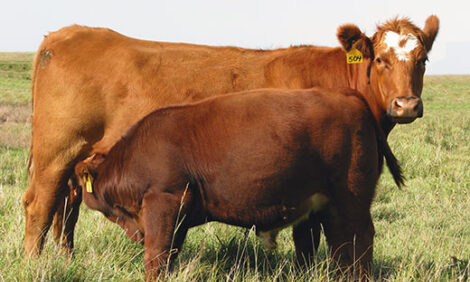



UK survey reveals Mycoplasma bovis more widespread than thought
Some types of analysis more sensitive than othersMycoplasma bovis is more widespread than previously thought, affecting beef and dairy cattle across the country, according to results from a new surveillance programme. It can be easily detected through bulk milk serology testing, which the results suggest are more sensitive than other forms of testing, according to a press release from Meadow Vets in the UK.
“For a few years, I have suspected that M. bovis is more prevalent than expected,” explains Graeme Fowlie, director of Meadows Vets in Aberdeenshire. “And from working with vets across the country taking part in the surveillance programme, it’s become clear that that is the case.”
The results, from vet practices across England, Scotland, Wales and Northern Ireland, show that M. bovis is present in every region, in both beef and dairy herds.
“It is probably present in your area, so you should be aware of it," said Fowlie.
The disease causes pneumonia, mastitis, swelling, sore joints and otitis, and is also likely responsible for a range of chronic underlying health issues, which have a significant impact on welfare and productivity.
As part of the surveillance programme, vets were offered free M. bovis tests, regardless of whether herds were exhibiting signs of disease or not. Of the 41 farms from across the UK taking part, 18 tested positive, six were inconclusive or void, and 17 were negative. But the results also revealed that some types of analysis were more sensitive than others.
Of the 25 blood tests, 52% were positive while 20% were inconclusive and 28% were negative – despite the fact that eight of those negative / inconclusive results were from farms with symptomatic animals. An interesting result was that the five bulk milk serology tests all came back positive. The 11 PCR tests – mainly of bulk milk samples – failed to show a single positive result.
“In the past two years we have found M. bovis on a number of farms after PCR testing lung samples taken post-mortem from pneumonia cases," said Ben Pedley, Farm Clinical Director at Willows Farm Vets, Cheshire. "Since diagnosing the infection, calf pneumonia on these units has been greatly reduced via management changes including specific vaccination programmes for Mycoplasma.”
Meadows Vets have found similar results to this study, said Fowlie.
“We have been using blood tests on calves over five months old to screen herds," he said. "Dairies could also be screened via bulk milk serology. Sick animals can be identified with PCR testing of either nasal swabs, post mortem material, joint fluid or milk samples.”
Since he started using these tests two years ago, he’s returned more positive samples than in the previous 20 years. “We are suspicious some of these would have been false negative results when using traditional bacterial culture testing, which we know is less sensitive," said Fowlie.
“One of the biggest problems with M. bovis is that it’s very hard to treat – it doesn’t respond to many common antibiotics, so prevention is much better than cure,” he continued. “That means screening herds via blood/bulk milk serology testing and PCR testing of sick animals/post-mortem samples to confirm the presence of the disease initially and have confidence in those results."
“It’s then important to adopt stringent biosecurity measures with careful herd management changes and vaccination where appropriate," Fowlie concluded. "Vets can now prescribe a multi-strain vaccine in the UK under the Cascade system. When combined with appropriate testing, will enable farmers to take a proactive and informed approach to disease management.”
The surveillance programme will continue this winter, with further free testing available to vets across the UK.



